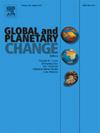Different impacts of temperature and precipitation on vegetation net primary production of global marsh wetlands
IF 4
1区 地球科学
Q1 GEOGRAPHY, PHYSICAL
引用次数: 0
Abstract
Until recently, the spatial-temporal changes and driving factors of vegetation net primary productivity (NPP) in global marsh wetlands remain unclear. Based on climate and MODIS NPP data, this study investigated the spatial-temporal variations of NPP and their response to climate variations in global marshes. The results indicated that annual NPP of global unchanged marshes showed a significant upward trend (16.1 g C·m−2/10a) during 2000–2022. The impacts of climate variations on marsh vegetation NPP exhibited different patterns in different regions. Annual temperature warming significantly increased NPP in global marshes, and this positive effect gradually weakened in warmer regions. We further found that the positive effects of daytime and nighttime warming on increasing NPP were asymmetric, with daytime warming having a more significant positive impact. At cold, high northern latitudes, the asymmetric positive impact was more significant. However, at hot low latitudes, the results were opposite: warming temperatures had asymmetric negative effects on marsh vegetation NPP. For the impacts of precipitation, precipitation had insignificant influence on global marsh NPP. But at arid mid-latitudes, increasing precipitation significantly increased marsh vegetation NPP, and the increasing effect gradually strengthened in warmer regions. Our results indicate that even in marsh with abundant water, the vegetation is also limited by available water in relatively arid environments. This study highlights different impacts of temperature and precipitation on marsh vegetation NPP in different regions, and suggests that the asymmetric effects of daytime and nighttime warming should be considered in ecosystem model simulations of global marsh vegetation productivity.
温度和降水对全球沼泽湿地植被净初级生产量的不同影响
迄今为止,全球湿地植被净初级生产力(NPP)的时空变化及其驱动因素尚不清楚。基于气候和MODIS NPP数据,研究了全球沼泽NPP的时空变化及其对气候变化的响应。结果表明:2000-2022年,全球未变化湿地年NPP呈显著上升趋势(16.1 g C·m−2/10a);气候变化对沼泽植被NPP的影响在不同区域表现出不同的模式。年增温显著增加了全球沼泽的NPP,这种正效应在温暖地区逐渐减弱。白天和夜间增温对NPP的正向影响不对称,日间增温对NPP的正向影响更为显著。在寒冷、高纬度的北纬地区,不对称的正影响更为显著。然而,在炎热的低纬度地区,结果相反:温度升高对沼泽植被NPP有不对称的负面影响。对于降水的影响,降水对全球沼泽NPP的影响不显著。而在干旱中纬度地区,降水增加显著增加了沼泽植被NPP,且在温暖地区增加作用逐渐增强。研究结果表明,在相对干旱的环境中,即使在水丰富的沼泽中,植被也会受到可用水的限制。该研究强调了温度和降水对不同地区沼泽植被NPP的不同影响,并建议在全球沼泽植被生产力的生态系统模型模拟中应考虑白天和夜间变暖的不对称效应。
本文章由计算机程序翻译,如有差异,请以英文原文为准。
求助全文
约1分钟内获得全文
求助全文
来源期刊

Global and Planetary Change
地学天文-地球科学综合
CiteScore
7.40
自引率
10.30%
发文量
226
审稿时长
63 days
期刊介绍:
The objective of the journal Global and Planetary Change is to provide a multi-disciplinary overview of the processes taking place in the Earth System and involved in planetary change over time. The journal focuses on records of the past and current state of the earth system, and future scenarios , and their link to global environmental change. Regional or process-oriented studies are welcome if they discuss global implications. Topics include, but are not limited to, changes in the dynamics and composition of the atmosphere, oceans and cryosphere, as well as climate change, sea level variation, observations/modelling of Earth processes from deep to (near-)surface and their coupling, global ecology, biogeography and the resilience/thresholds in ecosystems.
Key criteria for the consideration of manuscripts are (a) the relevance for the global scientific community and/or (b) the wider implications for global scale problems, preferably combined with (c) having a significance beyond a single discipline. A clear focus on key processes associated with planetary scale change is strongly encouraged.
Manuscripts can be submitted as either research contributions or as a review article. Every effort should be made towards the presentation of research outcomes in an understandable way for a broad readership.
 求助内容:
求助内容: 应助结果提醒方式:
应助结果提醒方式:


